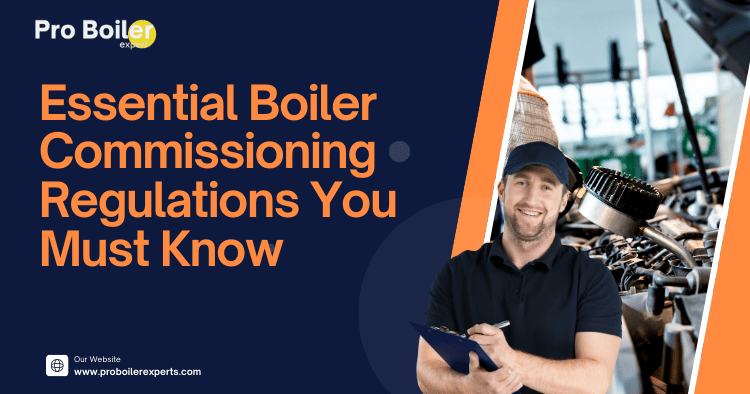Table of Contents
- Introduction
- What is Boiler Commissioning?
- Importance of Boiler Commissioning Regulations
- Key Boiler Commissioning Regulations
- Boiler Commissioning Process
- Common FAQs
- Conclusion
Introduction
Boilers play a critical role in heating systems, powering everything from residential homes to large industrial facilities. However, ensuring these systems operate safely and efficiently is paramount. That’s where boiler commissioning comes into play. In this article, we’ll explore the essential boiler commissioning regulations you need to be aware of to maintain compliance, ensure safety, and optimize performance.
Ensuring your boiler is properly commissioned can prevent costly repairs and enhance safety in your facility.
What is Boiler Commissioning?
Boiler commissioning refers to the systematic process of preparing a boiler for operation. This involves rigorous testing and adjustments to verify that the boiler meets all operational and safety standards. The commissioning process ensures that the boiler operates effectively, safely, and efficiently right from the start.
Key Steps in Boiler Commissioning:
- Installation checks
- System flushing
- Pressure testing
- Combustion analysis
- Safety device testing
Each of these steps is crucial to ensuring that the boiler functions as intended and meets all regulatory requirements.
Remember: A thorough commissioning process not only keeps your operations compliant but also maximizes boiler lifespan.
Importance of Boiler Commissioning Regulations
Boiler commissioning regulations are essential for several reasons:
- Safety: Ensuring that boilers operate without risk of failure or accidents.
- Efficiency: Optimizing performance to reduce fuel consumption and operating costs.
- Environmental Compliance: Meeting emissions standards set by regulatory bodies.
- Longevity: Proper commissioning can extend the lifespan of the boiler, reducing maintenance costs.
By adhering to these regulations, you not only ensure compliance but also contribute to a safer and more efficient work environment.
A well-commissioned boiler can save you money in the long run by reducing operational costs and minimizing risks.
Key Boiler Commissioning Regulations
Boiler commissioning regulations vary by region and are governed by various standards and legislation. Here’s a closer look at key regulations in different areas.
UK Regulations
In the UK, the primary regulations governing boiler commissioning include:
- The Gas Safety (Installation and Use) Regulations 1998: This regulation ensures that all gas appliances, including boilers, are installed, maintained, and operated safely.
- Building Regulations Part L: This sets out requirements for energy efficiency in buildings, including the performance of heating systems.
Additionally, new updates for 2024 focus on integrating smart technology with boiler systems to enhance efficiency and monitoring. For more information on UK regulations, visit HSE.gov.uk.
Staying updated with the latest regulations is crucial to maintaining compliance and ensuring safety.
European Regulations
In Europe, the main regulations include:
- EN 12952 and EN 12953: These are standards for water-tube and shell boilers, respectively, focusing on safety and efficiency.
- Energy Efficiency Directive (EED): This directive aims to promote energy efficiency across the EU, impacting boiler performance standards. Changes expected in 2025 will further tighten efficiency requirements.
For detailed insights on European commissioning standards, check Eur-Lex.eu.
International Standards
Globally, the following standards are crucial:
- ISO 9001: This standard outlines the criteria for a quality management system, which includes commissioning processes.
- ASME Boiler and Pressure Vessel Code: This code provides guidelines for the design, manufacture, and maintenance of boilers. Updates for 2024 include new safety protocols related to hybrid and electric boilers.
Refer to ISO.org for more information on international standards.
Boiler Commissioning Process
The boiler commissioning process involves several steps. Below is a simplified table outlining the typical stages:
| Step | Description |
|---|---|
| 1. Pre-commissioning Checks | Verify installation and ensure all components are in place. |
| 2. Flushing the System | Remove debris and contaminants from the system. |
| 3. Pressure Testing | Check for leaks and ensure structural integrity. |
| 4. Combustion Test | Analyze combustion efficiency and emissions. |
| 5. Final Adjustments | Make necessary adjustments based on test results. |
| 6. Documentation | Record all findings and compliance checks. |
Each of these steps is crucial for ensuring that the boiler operates safely and efficiently, in compliance with all relevant regulations.
Documentation is key—maintaining records of every step in the commissioning process can safeguard your business against future compliance issues.
Common FAQs
Q: What happens if a boiler is not properly commissioned?
A: A poorly commissioned boiler can lead to dangerous situations, including gas leaks, explosions, and increased emissions. It can also result in inefficient operation and higher energy costs.
Q: How often should a boiler be commissioned?
A: Boilers should be commissioned every time they are installed or replaced. Additionally, regular maintenance checks should be performed to ensure ongoing compliance and efficiency.
Q: Who is qualified to perform boiler commissioning?
A: Boiler commissioning should be conducted by a qualified technician who is familiar with local regulations and has experience with the specific type of boiler being commissioned.
Always ensure that you hire a certified professional for boiler commissioning to mitigate risks and ensure compliance.
Conclusion
Understanding and adhering to boiler commissioning regulations is crucial for anyone involved in the installation and maintenance of boilers. By ensuring compliance with these regulations, you can enhance safety, improve efficiency, and contribute to a more sustainable environment. Always consult with qualified professionals and stay informed about the latest regulations in your area.
For further reading, you may want to check out resources from the Health and Safety Executive or your local regulatory body to ensure you are well-informed.
By staying updated on these essential regulations, you can help create a safer, more efficient environment for everyone involved in boiler operations. Happy commissioning!
Also look for:
- Top 5 Benefits of Choosing Combi Boilers for Your Home
- Top 5 Benefits of Choosing a System Boiler for Your Home
- Top 5 Benefits of Conventional Boilers for Your Home
- Top 5 Smart Boilers Revolutionizing Home Heating 2024
- Understanding Boiler Installation Costs: Complete Breakdown
These links can provide additional insights into various boiler types, their benefits, and the financial aspects of installation.





